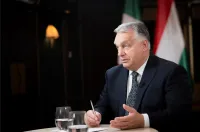Will Hungary succeed in forming an anti-Ukrainian bloc?
global.espreso.tv
Wed, 29 Oct 2025 11:55:00 +0200

The analytical community Resurgam reported the information.Discussions about Hungary’s potential to form an “anti-Ukrainian bloc” have intensified following remarks by Balázs Orbán, the political director to Prime Minister Viktor Orbán. In an interview with Politico, he suggested that such an alliance — based on the Visegrád Four (V4) model — could soon take shape, referencing the bloc’s previous coordination during the EU migration crisis.“I think it will happen (an alliance against Ukraine) — and it will become increasingly visible. It worked well during the migration crisis — that’s how we were able to resist,” Balázs Orbán said.The analytical community Resurgam reported that these statements reflect Hungary’s renewed attempt to position itself as a regional power center while appealing to nationalist voters ahead of the upcoming parliamentary elections. According to Resurgam, Orbán’s team is “using the rhetoric of an anti-Ukrainian bloc as a political tool to divert attention from domestic scandals and international setbacks.”Despite Orbán’s traditional advantages before elections and the fact that it may be too early to write him off, the elections — less than six months away — pose a serious challenge. The Hungarian leader has recently faced a series of political blows: pressure from Brussels, unfulfilled expectations surrounding visits from Vladimir Putin and Donald Trump, and another paedophilia scandal within his party — the second in a year.According to Resurgam, the announcement of an “anti-Ukrainian bloc” serves two key purposes:1. To divert public attention — particularly after the failed Budapest meetings that were meant to underscore Hungary’s geopolitical importance. U.S. Ambassador to NATO Matthew Whitaker recently refuted Foreign Minister Péter Szijjártó’s claims that Washington had granted Hungary an exemption on Russian oil imports, undermining Budapest’s credibility. Orbán’s team is therefore attempting to restore the image of Hungary as a “centre of power,” not an “outcast.”2. To preserve influence within the “Patriots for Europe” group — Orbán’s Fidesz party currently holds the second-largest delegation (11 MEPs) in this European Parliament group. However, if Orbán loses power domestically and Andrej Babiš’s ANO party consolidates control in the Czech Republic (with 7 MEPs), Prague could overtake Budapest as a leading force in the group. “Orbán’s alliance proposals are meant to project dominance and leadership within Patriots for Europe,” Resurgam notes.Yet, forming such an anti-Ukrainian bloc is far from straightforward.In the Czech Republic, President Petr Pavel has tasked Andrej Babiš with forming a government, but Babiš’s political position remains fragile. He has pledged to present a coalition agreement and governance plan within a week, emphasizing that the president is particularly concerned about foreign and security policy. A direct confrontation with Pavel — or an overt alignment with Orbán — would carry significant political risks both domestically and in Europe.Slovakia, meanwhile, has shown over the past two years that while it frequently clashes with Ukraine politically, it avoids actions that might trigger strong reactions from key EU members. Facing a severe budget crisis and the threat of European funds being frozen, Bratislava is unlikely to back Orbán’s confrontational stance.As Resurgam concludes, the fate of Orbán’s strategy depends on the outcome of Hungary’s elections in April 2026. Until then, Balázs Orbán’s statements should be seen mainly as a symbol of the Hungarian government’s hostility toward Ukraine, rather than a realistic geopolitical plan.“For now,” Resurgam analysts wrote, “this is less about policy and more about political theatre — a show of defiance from a government under pressure at home and abroad.”








